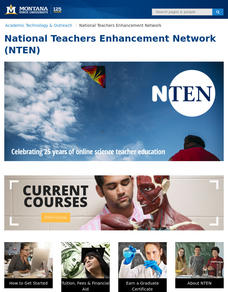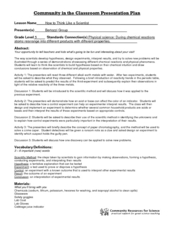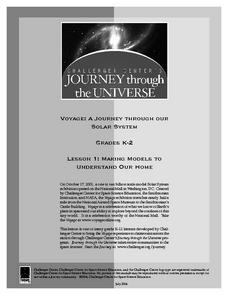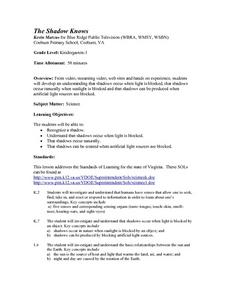Curated OER
Measuring the Diameter of Our Star
Students conduct an experiment to measure the diameter of the sun. In this astronomy lesson, students construct a simple equipment to collect scientific data. They calculate the sun's diameter using a given formula.
Curated OER
How Things Fly
Students, by drawing on their own experiences, discuss and examine the basic physics of flight. They participate in a variety of activities regarding flight.
Curated OER
Tasty Solution
Students examine the difference between a solvent, solute and solution. In this solutions lesson plan students complete an experiment and observe what happens when a solution is stirred.
Curated OER
Paleogeographic Mapping (o.k. Fossils Are Neat But What Good Are They?)
Students examine how evidence from fossils can be used in paleogeographic interpretation. They gain experience in developing multiple hypotheses.
Curated OER
Plants and Air Purity
Students explore how green plants help improve air quality. They read an article and discuss the importance of air quality and its effects on the human body. They investigate by connecting hose to the top of a Bell jar and to a funnel....
Curated OER
Ice Ain't Easy
High schoolers are told that objects in contact with one another reach an equilibrium temperature. A hot object placed in a cool liquid always cool off. It never happens that the object gets hotter and cool liquid gets colder. Students...
Curated OER
Through A Pinhole
Students construct a pinhole camera using their knowledge of the physics of light. This interdisciplinary activity give students hands-on experience in understanding the production and processing of photographic images.
Curated OER
Aquifers
Students participate in an experiment about aquifers. They answer questons and make observations about the experiment. They discuss how they can make a difference in the way water is used.
Curated OER
Screening River Rocks
First graders explore river rocks. Searching with screens and containers, 1st graders identify the different kinds and sizes of rocks. They separate rocks into containers according to pebbles, gravel and sand. Students write about their...
Curated OER
Thinking Like a Scientist
Students explore the scientific method. Students identify the steps in the scientific method and explain what each step means. Students use these steps to determine if boys or girls are taller in their classroom.
Curated OER
Model Volcanoes
Students represent volcanoes with models and sketches. They research volcanoes and plan how to build a model. They, in groups, build a model volcano and cause it to erupt making observations before and after the eruption.
Curated OER
How to Think Like a Scientist
Fifth graders study the scientific method and understand how to apply it. In this "thinking like a scientist" lesson students complete several activities.
Curated OER
Making Models To Understand Our Home
Students investigate the concept of a model and how it is used to represent something that is real. They recognize how the model can be applied to other types of concepts like the solar system. Students create a scale drawing of a house...
Curated OER
The Shadow Knows - Creating Shadows
Young learners recognize a shadow and witness how shadows occur when light is blocked. They access streamed video, standard video, and websites in order to engage in their study of how light is naturally blocked to create shadows. An...
Curated OER
Climatic Zones
Third graders recognize and locate Frigid, Temperate, and Torrid climatic zones on the word map or globe. They explain that plants, animals, and human societies display adaptations to the climates they live in .
Curated OER
Analyzing the Relationship between Snowpack and River Flow
Students use the Internet to research current and past snowpack levels and river gauging station readings. They determine the relationship between snowpack and river flow. They predict future river flow.















